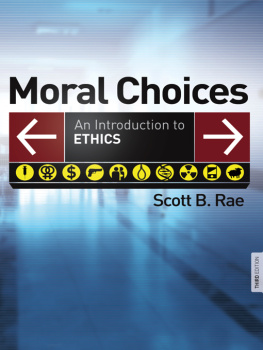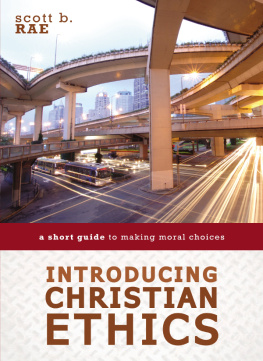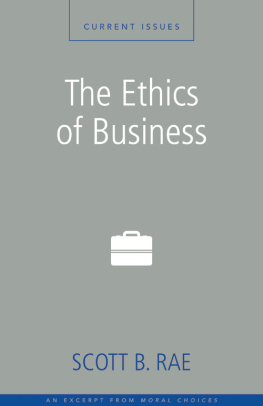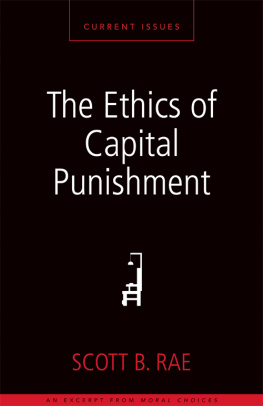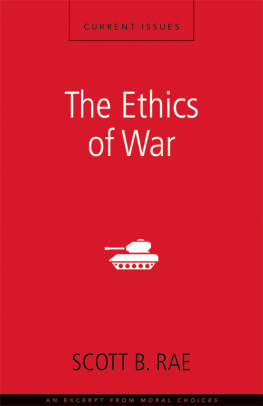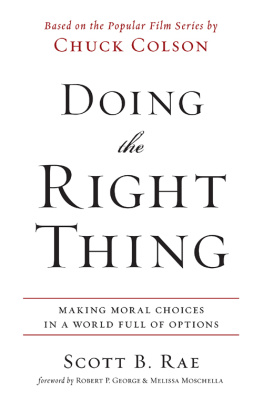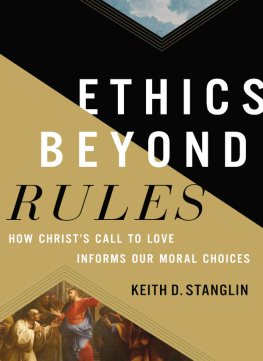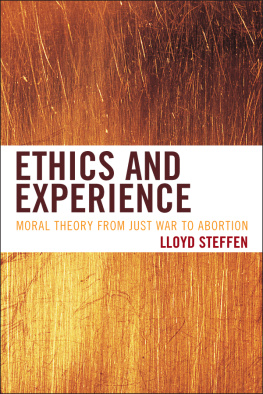Scott Rae is one of the leading evangelical ethicists in North America, and this thoroughly updated version of Moral Choices features the excellence we have come to expect from his pen. Based on its breadth of coverage, depth of insight, and accessibility of style, it is now the go-to text for colleges and seminaries. It is also a must-read for pastors and laypersons who want to be informed about the ethical issues of our day. I highly recommend it.
This is a well-crafted introduction to Christian ethics. Professor Rae exhibits in his work the very virtues that he extols his readers to emulate. His love of learning, Christ, and the good, the true, and the beautiful comes through loud and clear. Although one may find oneself disagreeing with Professor Rae, as I do on a few issues, you will be more informed, challenged, and enlightened as a consequence of reading this book.
ZONDERVAN
Moral Choices
Copyright 1995, 2000, 2009 by Scott B. Rae
All rights reserved under International and Pan-American Copyright Conventions. By payment of the required fees, you have been granted the non-exclusive, non-transferable right to access and read the text of this e-book on-screen. No part of this text may be reproduced, transmitted, downloaded, decompiled, reverse engineered, or stored in or introduced into any information storage and retrieval system, in any form or by any means, whether electronic or mechanical, now known or hereinafter invented, without the express written permission of Zondervan.
ePub Edition September 2009 ISBN: 978-0-310-32323-5
This title is also available as a Zondervan ebook.
Visit www.zondervan.com/ebooks.
Requests for information should be addressed to:
Zondervan, Grand Rapids, Michigan 49530
Library of Congress Cataloging-in-Publication Data
Rae, Scott B.
Moral choices: an introduction to ethics / Scott B. Rae3rd ed.
p. cm.
ISBN 978-0-310-29109-1 (hardcover)
1. Ethics. I. Title.
BJ1012.R32 2009
170dc22 2009005151
All Scripture quotations, unless otherwise indicated, are taken from the Holy Bible, New International Version. NIV. Copyright 1973, 1978, 1984 by International Bible Society. Used by permission of Zondervan. All rights reserved.
All Scripture quotations marked TNIV are taken from the Holy Bible, Todays New International Version. Copyright 2001 by International Bible permission of Zondervan. All rights reserved.
Scripture quotations marked KJV are taken from the King James Version of the Bible.
Scripture quotations marked NASB are taken from the New American Standard Bible. Copyright 1960, 1962, 1963, 1968, 1971, 1972, 1973, 1975, 1977, 1995 by The Lockman Foundation. Used by permission.
Any Internet addresses (websites, blogs, etc.) and telephone numbers printed in this book are offered as a resource. They are not intended in any way to be or imply an endorsement by Zondervan, nor does Zondervan vouch for the content of these sites and numbers for the life of this book.
All rights reserved. No part of this publication may be reproduced, stored in a retrieval system, or transmitted in any form or by any meanselectronic, mechanical, photocopy, recording, or any otherexcept for brief quotations in printed reviews, without the prior permission of the publisher.
Interior design by Matthew Van Zomeran
Special thanks and appreciation are due to a number of important people who enabled this third edition to become a reality. Thanks to my colleagues at Talbot School of Theology, particularly in the philosophy department, for their intellectual stimulation and encouraging friendshipsyou guys provide a great environment in which to work. My deans at Talbot, Dennis Dirks and Mike Wilkins, provide substantial encouragement for writing and flexible schedules in order to finish projects and meet deadlines. Special thanks to Jim Ruark at Zondervan, who has overseen the editing of all three editions of Moral Choicesthanks for your thorough and careful work. You have made each of the three editions better. I have much appreciation for Katya Covrett, my senior editor at Zondervan, for her initiative and creativity in proposing the changes for this edition.
Many thanks to Zondervan for their desire to publish a third edition of this book. I trust that it will continue to be a useful tool, now more beneficial with the updates made for this new edition.
To my wife, Sally, and my sons, Taylor, Cameron, and Austinthanks for your patience with me when I was getting this finished. You all are such an encouragement, and I am grateful for all that you mean to me.
I dedicate this third edition to my late father, Walter B. Rae, who taught me about morality from the way he lived.
The teaching of ethics and morality has never been more challenging than it is today. Each morning of this twenty-first century seems to bring with it a news story or societal revelation that forces us to cogently think through ethical ramifications that even Solomon would have difficulty discerning.
Moral Choices is an introductory textbook written at an accessible level that allows students to clearly enter a field of study that otherwise could quickly become a quagmire. Use it with confidence in the classroom as it presents some of the most pressing moral issues facing us today, including abortion, euthanasia, homosexuality, war, capital punishment, reproductive technologies, and moral authority.
About the Author
Believing morality ultimately issues from the character of God, Dr. Scott Rae, in teaching this subject, combines biblical studies with ethical relevancy while maintaining a timely and current perspective on such topics as connecting the law and morality, natural law in Christian ethics, the social dimension of Old Testament ethics, and the biblical background of abortion.
Writing Style
Readers will appreciate the books succinct approach to these weighty matters. It does not deteriorate into theoretical jargon or obtuse philosophies. Rather, it unpacks key terms and distinctions in ethics to help readers become more familiar with this new territory.
Organization
As new subjects are introduced and discussed, they are headlined in bold text for easy reference. Ethical dilemmas are exposed, and the author makes the case both for and against them, allowing readers to see both sides. Sidebars highlight how historic figures, documents, and events have influenced thought and dialogue about ethics.

